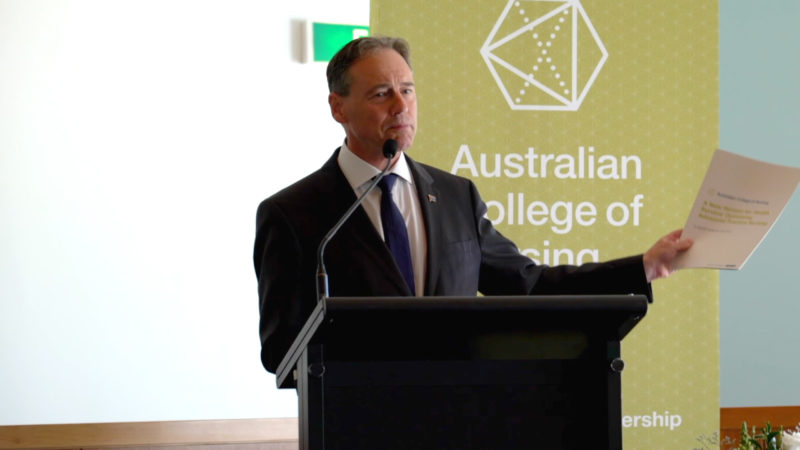AUSTRALIAN TELETRIAL PROGRAM REACHES SIGNIFICANT MILESTONES IN TRIALS AND PARTICIPANTS From origins in Townsville to being national program across multiple disease states and populations
Filmed in Brisbane & Townsville, Queensland and Darwin, Northern Territory | November 2024
Launched in 2022, the Australian Teletrial Program is an initiative designed to improve access to clinical trials for people living in regional and remote areas of Australia. It uses telemedicine and digital technologies to enable patients to participate in clinical trials without needing to travel long distances to major metropolitan centres, which can often be a barrier to participation for those in rural and isolated locations.
The program connects patients with researchers, medical professionals, and trial coordinators via video consultations and telehealth tools. This allows patients to receive treatment and follow-up care from their local healthcare providers, while still participating in high-quality clinical research.
Key Features of the Australian Teletrial Program:
- Remote Access to Trials: It facilitates the inclusion of patients from regional and remote areas who would otherwise have difficulty accessing clinical trials due to distance or travel constraints.
- Collaboration: The program involves partnerships between local healthcare providers, hospitals, research institutions, and trial sponsors. This collaborative model ensures that patients receive the best care and support throughout the trial process.
- Digital Health Technologies: Telehealth technologies, such as video conferencing, remote monitoring, and digital data collection, are used to manage patient care and ensure compliance with trial protocols.
- Widening Participation: It aims to diversify and increase the representation of regional and rural populations in clinical trials, which is important for trial results to include the broader population.
The Teletrial Program is part of a broader effort to improve the inclusivity and accessibility of medical research across Australia, ensuring that individuals, regardless of their location, have the opportunity to participate in cutting-edge clinical trials.
Recently Australian Health Journal met with Kaye Hewson, Director, Australian Teletrials Program, who spoke about the program’s recent achievements:
- Being a proven program outside of oncology, with clinical specialties such as respiratory, cardiac, diabetes, sexual health, mental health filling a gap in service and equity.
- In regional, rural and remote places, with adults and paediatrics involved in the program, a higher than national average participation rate of clinical trials by First Nations peoples in satellite locations.
- Savings of time, money and distance for those patients to satellite sites.
- Having over a thousand participants in teletrials across the six jurisdictions.
- Established collaborative and supportive mechanism and network around education and training.
Australian Health Journal also spoke with Melanie Poxton, Assistant Director of Nursing at the program’s Queensland Regional Clinical Trials Coordinating Centre (QRCCC) in Townsville University Hospital, North Queensland and Heather Parker, the Northern Territory Australian Teletrial Program Manager with NT Health.
Produced in collaboration with the Australian Teletrial Program.
You Might also like
-
Clinical research integrates with GP and Pharmacist workflows to supplement practice revenue
Clinical trials are crucial to the development of evidence-based preventative medicines. In addition, participation in clinical trials can also provide patients with opportunities to access new treatments.
“Clinical trials are at the heart of medical advances which look into new ways to treat, prevent, or detect disease. Volunteers often do so to help contribute to advancing scientific research, knowing that they are participating in the hope of helping future generations,” said Charlotte Bradshaw, CEO and Founder to Evrima Technologies.
-
“Nurses can do more, should do more and now they will do more”, The Hon Minister Greg Hunt MP, Minister for Health.
Advanced Practice Nurses comprise 9% of the total nursing workforce, with 26,000 clinicians Australia wide. However although highly skilled, they are under-utilised and constrained to the full scope of practice. The Australian College of Nursing believes this needs to change. Nurse led models of care in which Advanced Practice Nurses play a significant role in service provision, must feature in the future. ACN President Professor Christine Duffield FACN states, “It’s now widely acknowledged internationally that nurses can provide a clinical and very valuable service that’s better suited to the healthcare needs of some consumer groups.”
-
Strong primary care nursing solutions for a healthier Australia
The CEO of Australian Primary Health Care Nurses Association (APNA), Ken Griffin spoke with Australian Health Journal about the following:
– APNA President Karen Booth representing Primary Care Nursing in the Australian Government led Strengthening Medicare Task Force
– The current key challenges in primary care nursing
– Programs on diversity and student placement proposed in APNA’s pre-budget submission to Federal Government
– A proposed initiative called Nurse-Supported Self-Care, with broadening role primary care nursing would play in the community
– Hopes for other health priorities addressed in the Federal BudgetIn the lead up to the Australian Federal Budget in May 2023, Australian Health Journal reached out to peak health industry bodies to hear about their priorities, either noted in pre-budget submissions lodged with Federal Government in January 2023 or in recent forums such as the Strengthening Medicare Taskforce.



